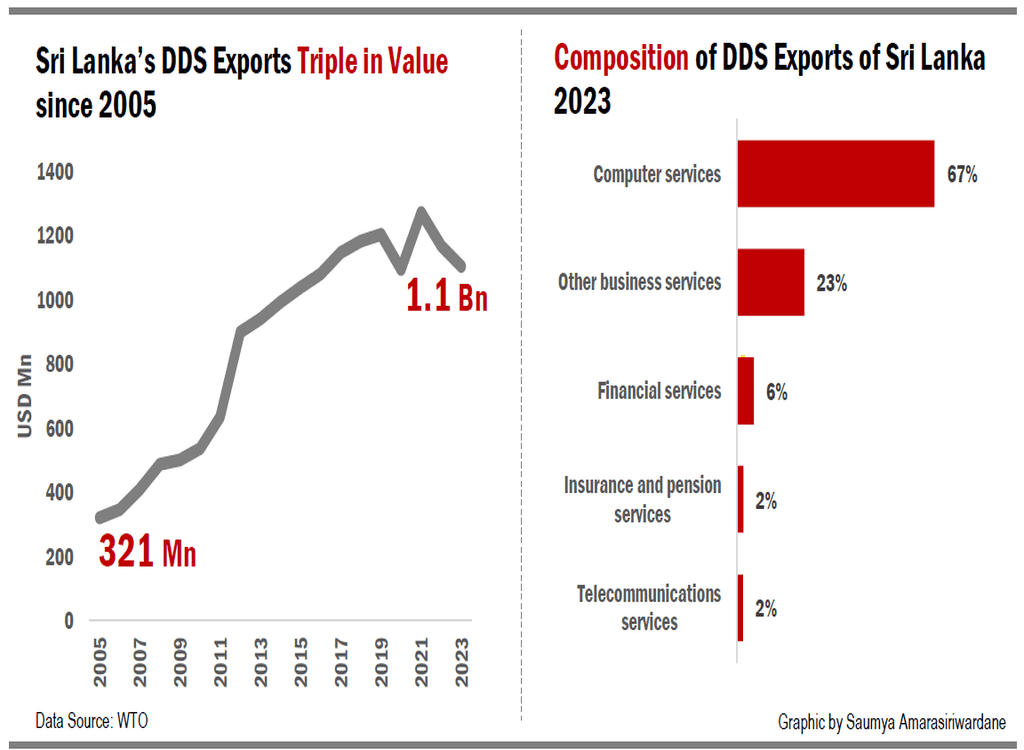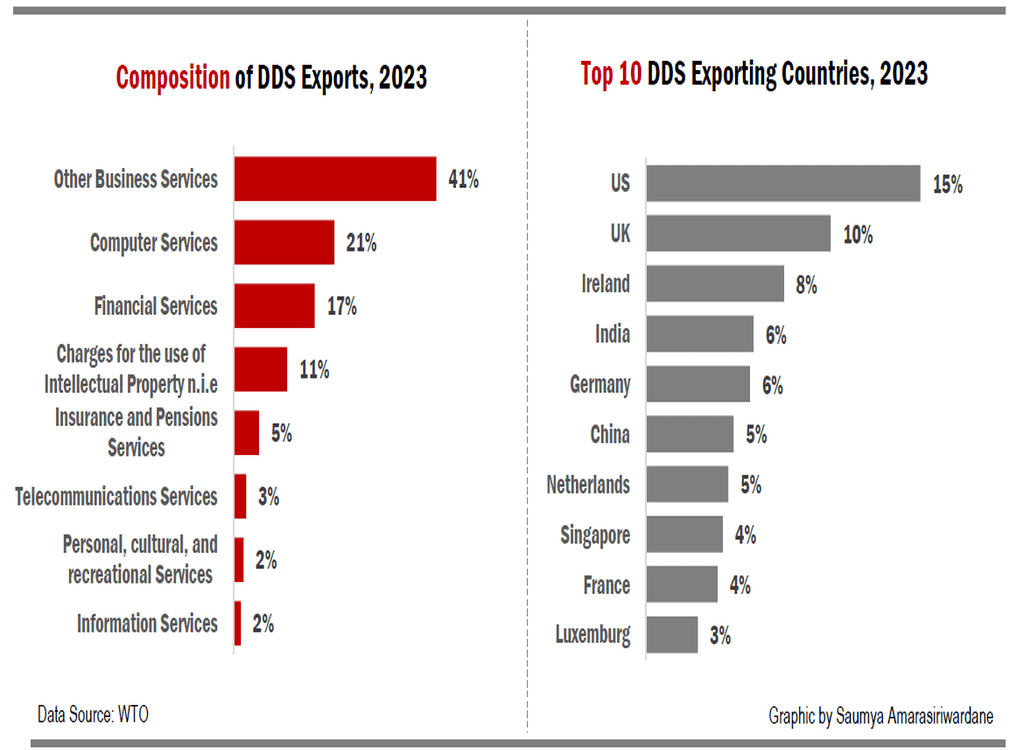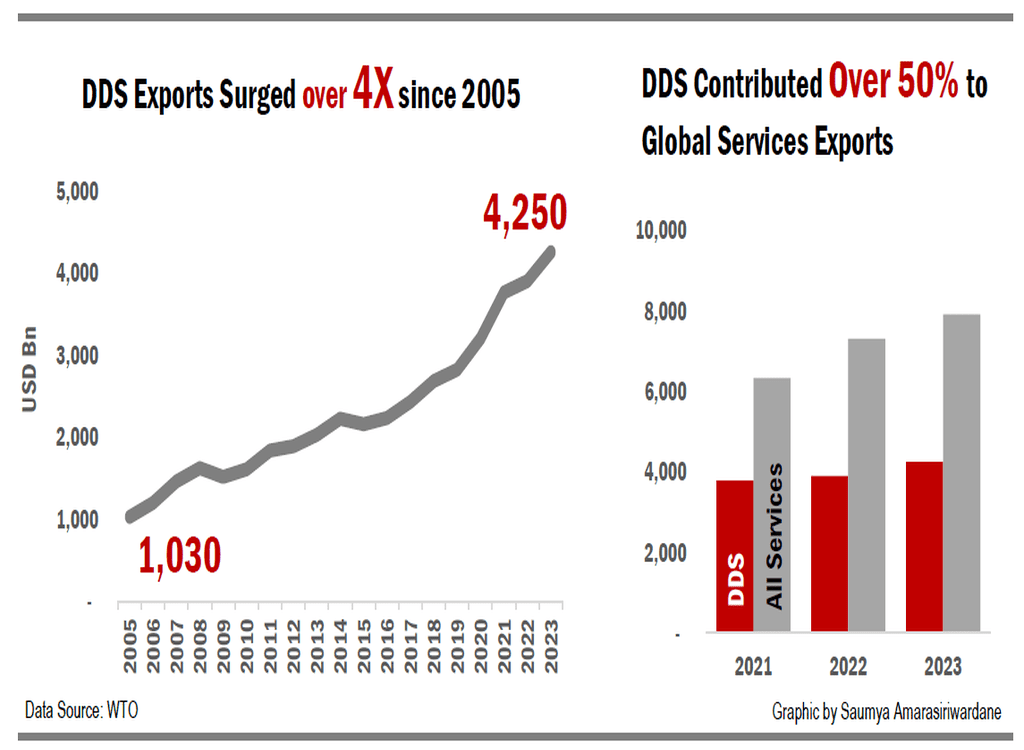By Saumya Amarasiriwardane
In today’s interconnected world, digital technology is reshaping the global economy at an unprecedented pace.
Amongst its many transformations, the rise of digitally delivered services has emerged as a defining trend in the global trade.
From financial technology solutions to cloud computing and e-learning platforms, these services are increasingly becoming indispensable.
Embracing this sector could unlock a transformative pathway for Sri Lanka’s economic growth and global competitiveness.

What are Digitally Delivered Services?
According to the World Trade Organisation (WTO), “Digitally Delivered Trade/ Services (DDS)” are all international trade transactions that are delivered remotely over computer networks.
A few examples are IT services, digital marketing, online education and cloud-base solutions. Unlike digital ordering, which is instantaneous, digital delivery can take place over a long period and can involve a significant level of interpersonal interaction in the delivery of the service, but when such interaction happen, they occur remotely through computer networks.
As such, the range of technologies relevant to digital delivery is wider than for digital ordering; services delivered through video calls and manually typed email, as well as voice calls and any other digital communication devices, and through cloud networks are included in DDS.

Global Trends in Digitally Delivered Services (DDS)
According to the WTO, exports of DDS have increased fourfold in value since 2005, significantly outpacing the growth of goods and other services exports.
By 2023, DDS accounted for over 54% of the world’s total services exports and contributed 13.8% to the combined total exports of goods and services.
Understanding the composition of DDS and top exporting countries in the world provides valuable insights into this rapidly growing sector.
Several factors have fueled this robust growth of DDS exports globally. A key catalyst was the COVID-19 pandemic, which accelerated digital transformation worldwide.
As companies shifted to remote work, e-commerce platforms thrived, and telemedicine became a necessity, the pandemic normalized the use of digitally delivered services in both daily life and business operations.
The World Bank notes, “The COVID-19 pandemic brought about unprecedented acceleration of digital transformation across the globe—with spikes in data traffic, app usage, IT sector growth, digital business resilience, and much more.”
Advancements in technology have further broadened the scope of DDS.
Innovations in artificial intelligence (AI), blockchain, cloud computing, and 5G have revolutionized various industries.
AI-driven analytics now provide greater precision in financial services, while blockchain streamlines supply chain management.
Platforms for global freelancing, IT outsourcing, and cloud solutions have enabled seamless international collaboration.
Gig economy platforms such as Fiverr and Upwork empower millions of professionals worldwide to deliver services across borders.
Several countries have established themselves as global leaders in DDS exports.
India, for instance, recorded DDS exports valued at USD 257 billion in 2023, achieving a 17% year-on-year growth. As the fourth-largest exporter of digitally delivered services globally, India accounted for 6% of the world’s total DDS export share.
This sector has created millions of high-value jobs in their country. Similarly, Ireland has become global player in outsourcing IT services.
Estonia, renowned for its robust e-governance framework, has capitalized on its tech-savvy population to provide digital services on a global scale.
These trends underscore the immense potential of DDS to reshape global trade, offering opportunities for nations to harness technology and talent to drive economic growth.

Why Digitally Delivered Services Matter for Developing Countries?
For developing nations, DDS represent an extraordinary opportunity to drive economic growth and foster inclusivity.
Unlike traditional exports that often require significant physical infrastructure and logistical networks, DDS rely primarily on skilled human capital, making them more accessible for countries with limited resources.
By focusing on building a digitally skilled workforce, developing nations can create high-value jobs that contribute to long-term economic stability.
DDS also hold the potential to bridge socio-economic gaps.
Digital platforms eliminate many traditional barriers to entry in global trade, empowering rural populations, women, and young entrepreneurs to access international markets and compete on an equal footing.
This inclusivity not only enhances income opportunities for marginalized groups but also fosters innovation by diversifying participation in global commerce.
Additionally, the inherent resilience of DDS is a significant advantage for developing economies.
Unlike goods trade, which is often vulnerable to supply chain disruptions, geopolitical tensions, or natural disasters, DDS are delivered through digital infrastructure, ensuring continuity and stability in trade activities.
This resilience is particularly critical for countries striving to build sustainable and robust economic systems.
Moreover, DDS exports provide a vital source of foreign exchange earnings.
By offering services to global markets, developing countries can strengthen their foreign exchange reserves, reduce trade deficits, and enhance overall economic stability.
These earnings can be reinvested into national development initiatives, further accelerating progress in areas such as education, healthcare, and infrastructure.
Sri Lanka’s Position in DDS Landscape
Sri Lanka’s exports of DDS have demonstrated significant growth over the years, recording a threefold increase since 2005.
As per the WTO, Sri Lanka’s value of DDS exports rose from USD 321 million in 2005 to USD 1.1 billion in 2023.
According to the Central Bank of Sri Lanka, total IT/BPM services exports recorded at Despite this notable progress, Sri Lanka’s contribution to the global DDS export market remains minimal.
Analyzing the composition of Sri Lanka’s DDS exports, over 65% comprises computer services, followed by other business services, highlighting the country’s reliance on its IT sector within this space.
Sri Lanka has immense potential to position itself as a competitive player in the global DDS market.
Renowned for its talented, English-speaking workforce, Sri Lanka is well-equipped to attract international clients for IT-enabled services.
Furthermore, the increasing internet penetration and mobile connectivity across Sri Lanka are fostering a digital ecosystem.
According to the World Bank, 50% of the population now has access to the internet, while computer literacy and digital literacy have risen to 40% and 64%, respectively, as of first half of 2023.
This growing digital foundation is enabling local businesses to adapt to digital platforms, creating a strong domestic base for innovation in DDS.
These advancements highlight Sri Lanka’s potential to strengthen its foothold in the global DDS landscape.
The Pathway Forward: Unlocking the Full Potential of DDS
Despite its immense potential, Sri Lanka faces several barriers that must be addressed to fully capitalize on DDS.
Challenges such as inadequate digital infrastructure, regulatory hurdles, limited awareness of DDS opportunities, and a traditional export-focused mindset are hindering the sector’s growth.
In his recent throne speech to Parliament, the President of Sri Lanka highlighted the government’s recognition of the IT sector as a key driver of short-term economic growth.
According to the President, Sri Lanka currently has around 85,000 IT professionals, and the government aims to increase this number to 200,000 within the next five years.
Concurrently, the target for IT export revenue has been set at USD 5 billion, underscoring the ambition for a transformative shift in the sector.
To support this vision, the government has also prioritized digitalization and the broader digital economy, establishing a dedicated Ministry for Digitalization—a clear indication of its commitment to advancing this agenda.
“Digitalization is the transformational opportunity of our time—but only for those who are connected,” remarked Axel Van Trotsenburg, Senior Managing Director at the World Bank.
He further emphasized that Without access to the internet and the skills to use digital technologies effectively, nations are essentially locked out of the modern world.
To overcome these challenges, Sri Lanka must invest in robust digital infrastructure.
Public-private partnerships can play a pivotal role in addressing infrastructure gaps, while ensuring that digital platforms are accessible, affordable, and secure.
Establishing comprehensive national data protection laws and cybersecurity frameworks is equally critical to fostering trust and enabling growth in the digital economy.
Skill development is another vital area for growth. Expanding vocational training programs in IT, software development, and other digital skills will prepare the workforce to meet global DDS demands.
Encouraging digital entrepreneurship is also essential. Initiatives such as providing seed funding, incubation centers, and mentorship for startups can drive innovation in the sector.
IT/BPM industry related associations and local incubators can play a significant role in creating networks and fostering collaboration among entrepreneurs in the DDS space.
By addressing these barriers and fostering a supportive ecosystem, Sri Lanka can position itself as a competitive player in the global DDS market, driving economic growth and digital transformation.
*The writer is an economist at the Ceylon Chamber of Commerce. The views and opinions expressed in this article do not necessarily reflect the position of her organization.











Leave a comment